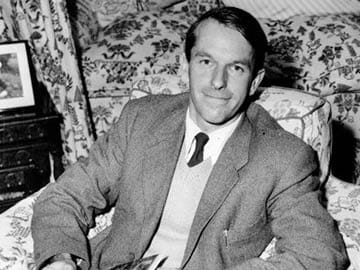
FILE - In this Oct. 28, 1958 file photo, Dr. Frederick Sanger, research Biochemist at Cambridge University, poses in his home in Cambridge, England.
London:
British biochemist Frederick Sanger, who twice won the Nobel Prize in chemistry and has been called the father of the genomic era passed away yesterday at 95.
The Wellcome Trust Sanger Institute announced the death today. It did not provide further details.
Sanger died in his sleep yesterday at Addenbrooke's Hospital in Cambridge, according to the MRC Laboratory of Molecular Biology of which the biochemist was a founding member.
The MRC Laboratory called him an "extremely modest and self-effacing man whose contributions have made an extraordinary impact on molecular biology."
Jeremy Farrar, director of the Wellcome Trust, called Sanger "the father of the genomic era."
Sanger first won the Nobel Prize in 1958 at the age of 40 for his work on the structure of proteins. He had determined the sequence of the amino acids in insulin and showed how they were linked together.
He later turned his attention to the sequencing of nucleic acids and developing techniques to determine the exact sequence of the building blocks in DNA.
That work led to Sanger's second Nobel Prize, awarded jointly in 1980 with Stanford University's Paul Berg and Harvard University's Walter Gilbert, for their work in determining base sequences in nucleic acids.
Sanger was born on Aug. 13, 1918, in Gloucestershire, England. While he initially planned to study medicine, like his father, he switched fields and went on to earn a degree in natural sciences from Cambridge University and later a PhD on protein metabolism from the same university.
He retired in 1983.
The Wellcome Trust Sanger Institute announced the death today. It did not provide further details.
Sanger died in his sleep yesterday at Addenbrooke's Hospital in Cambridge, according to the MRC Laboratory of Molecular Biology of which the biochemist was a founding member.
The MRC Laboratory called him an "extremely modest and self-effacing man whose contributions have made an extraordinary impact on molecular biology."
Jeremy Farrar, director of the Wellcome Trust, called Sanger "the father of the genomic era."
Sanger first won the Nobel Prize in 1958 at the age of 40 for his work on the structure of proteins. He had determined the sequence of the amino acids in insulin and showed how they were linked together.
He later turned his attention to the sequencing of nucleic acids and developing techniques to determine the exact sequence of the building blocks in DNA.
That work led to Sanger's second Nobel Prize, awarded jointly in 1980 with Stanford University's Paul Berg and Harvard University's Walter Gilbert, for their work in determining base sequences in nucleic acids.
Sanger was born on Aug. 13, 1918, in Gloucestershire, England. While he initially planned to study medicine, like his father, he switched fields and went on to earn a degree in natural sciences from Cambridge University and later a PhD on protein metabolism from the same university.
He retired in 1983.
Track Latest News Live on NDTV.com and get news updates from India and around the world

